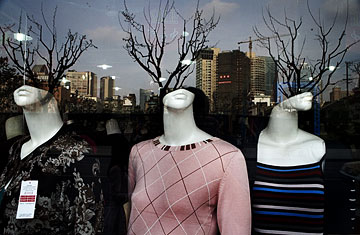
A window displaying women's clothing in the Bund area of Shanghai, China
Since the global financial crisis hit last year, Chinese officials have been firm about the need to maintain about 8% economic growth to ensure stability. Before the last office door swung shut at Lehman Brothers in New York, Beijing was planning how to get there, eventually unleashing a massive $586 billion stimulus package in the spring and freeing up lending to allow billions more to slosh into the economy. With this week's announcement that GDP had expanded by 8.9% in the third quarter, China is well on its way to reaching its target for the year. That will make China the first major economy to emerge from the slowdown. But it is far too soon for the country's economic mandarins to hang a "Mission Accomplished" banner.
"While we have avoided the worst recession since the Great Depression, we are probably heading for another asset bubble and more financial turbulence," Qin Xiao, chairman of China Merchants Group, wrote in Thursday's Financial Times. Qin said he didn't think "a quick, steep bounce driven by fiscal fixed investment is a good thing for China," adding that the current loose monetary policy should shift to neutral. On Thursday, Hong Kong's Hang Seng Index dropped by 0.5% and the Shanghai Composite Index fell 0.6% on concerns that China would begin to tighten monetary policy in response to fears of expanding bubbles in real estate and financial markets.
But economists said the country is likely to keep its foot on the gas to ensure the recovery doesn't falter. On Wednesday, the State Council, China's cabinet, said it would focus on achieving a balance between promoting growth, rebalancing the economy and "managing inflation expectations." Nomura economist Mingchun Sun argues that because the State Council's statement emphasized "expectations," rather than inflation itself, the government doesn't believe inflation is a major risk and will maintain a loose monetary policy in the near future.
Despite China's strong rebound this year, Chinese officials remain cautious. On Sept. 11 Premier Wen Jiabao said "the stabilization and recovery of the Chinese economy is not yet steady, solid and balanced." China's stimulus package — the equivalent of 14% of GDP — focused on large infrastructure projects, work often done by large state-owned construction firms. Similarly, the lending spree was primarily directed at state-owned enterprises that offer banks an implicit guarantee that the government will cover outstanding debts. The downturn in exports mainly hurt small- and medium-sized firms in the south, which are usually private owned. The result is that while profits are climbing for large, state-owned firms, the private sector is lagging. "The biggest challenge for the authorities is that the private sector has yet to fully recover. This makes it difficult to tighten early," Ben Simpfendorfer, a Hong Kong-based China economist for RBS, wrote in a research note. "It also funnels money into equity and housing rather than the real economy. The temptation will be to leave policy too loose, for too long, resulting in another asset price bubble."
China has subsidized purchases for some goods including small passenger cars and household appliances, which has led to a boom in spending in certain sectors. Passenger vehicle sales climbed 84% last month, and China is expected to surpass the U.S. as the largest car market this year. Consumers have also bought hundreds of thousands of refrigerators, washing machines and other appliances under a government promotion this year.
But while sales have climbed, economists say the government has yet to push through the sort of reforms that would make consumer spending a solid economic pillar. Chinese are still among the world's biggest savers, in part because of the lack of good public systems for retirement pensions and health insurance. "Most economists think they've overdone investment and underdone consumption and spending for social welfare," says Stephen Green, the Shanghai-based head of research for Standard Chartered Bank. "There will be a price to pay. No one knows how big that will be. The bet is they'll grow through it. That's the bet they're taking."
